The annual Statement of Financial Information report (SOFI) received by Whistler’s mayor and council on June 20 shows a municipality acquiring and retaining a growing number of employees.
As in previous years, the report reveals the top earners at municipal hall who brought in more than $75,000 in total remuneration. In 2022, 169 employees made the Resort Municipality of Whistler’s (RMOW) list of top earners, an 8.3-per-cent increase from the 156 employees the year before, and significantly higher than the 128 employees who made the list in 2020.
In an interview with Pique, RMOW chief administrative officer (CAO) Ginny Cullen and human resources director Denise Wood explained that the increase in employees earning over $75,000 is due to increased retention, staff changing roles internally, position benchmarking against other municipalities, and an interim two-per-cent wage increase in 2022.
“The SOFI report is a provincial requirement that provides the government of B.C. and the public a snapshot of expenses and revenues for any given year to provide accountability and transparency to municipal spending,” Cullen said.
Remuneration for the RMOW’s top 169 employees totalled $17,926,459, more than half of the $32,153,888 the municipality spent on wages in 2022. The remaining $14,227,429 went to employees earning less than $75,000.
Of those 169 employees, four people made more than $200,000 in 2022, including Cullen, whose total remuneration (which, for all employees on the SOFI list, includes things like employee contributions to the Canada Pension Plan, employment insurance and health benefits) was $245,155.
GM of corporate and community services Ted Battiston ($201,971); GM of infrastructure services James Hallisey ($201,055); and GM of resort experience Jessie Gresley-Jones ($200,536) were the other three. In 2021, only Cullen exceeded the $200,000 salary mark.
According to Wood, the RMOW implemented an interim two-per-cent wage increase for handbook employees and Canadian Union of Public Employees (CUPE) staff in 2022, and is heading to bargaining for a new collective agreement with the union shortly.
Municipal hall is undertaking a full wage benchmark review for handbook employees this year to bring wages into line with comparative Metro Vancouver cities such as New Westminster, North Vancouver, West Vancouver, Coquitlam and Delta.
“That ensures that we are paying our staff comparable to similar roles in the same type of organizations, and because of that, there are some roles that have increased in pay to be able to match the market that we’re trying to maintain equity to, or within,” Cullen said.
Increased retention is also a factor in the rising payroll, as longer tenures naturally result in higher wages. Wood noted the municipality’s yearly employee turnover is reasonably low compared to most organizations. In 2022, the RMOW had an eight-per-cent turnover, which is considerably better than the neighbouring Village of Pemberton’s 25-per-cent turnover rate.
Some employees also saw considerable wage increases due to moving into higher-paid roles within the RMOW, such as becoming a department manager, which Wood said also helps with retention.
The RMOW still faces difficulty recruiting employees, but the situation isn’t as dire as in 2021, when staff shortages and a ransomware attack created a significant permitting backlog. In 2022, the municipality advertised 73 job openings, hired 54 employees, and is reviewing applications for 17 positions, with four currently open.
“I’d say that, like most employers, we’re challenged with recruitment and retention in a number of areas in our organization, so not all areas, but some of them,” Cullen said. “We’re committed to recruiting and retaining experienced municipal staff who are passionate about Whistler and making a positive contribution to their community.”
Provisions of goods and services remained the most significant expense for the municipality, totalling $98,294,155 in 2022, up nearly $18 million from the $80.2 million spent in 2021. Of that, $5,762,577 went to suppliers for payments under $25,000.
The most significant payments were to Tourism Whistler ($6,136,576), followed by Corona Excavations ($5,874,436), Coastal Mountain Excavations ($5,360,295), BC Transit ($4,192,177), Receiver General ($3,720,441—for local policing costs), and GFL Environmental Inc. ($3,548,301).
Find the full SOFI report in the June 20 council package (available at whistler.ca/council) and read more at whistler.ca/budget.




